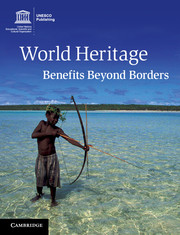Book contents
- Frontmatter
- Contents
- Foreword
- List of Acronyms
- Introduction
- Section 1 Bridging Nature and Culture
- Section 2 Urbanism and Sustainable Heritage Development
- Section 3 Integrated Planning and Indigenous Engagement
- Section 4 Living Heritage and Safeguarding Outstanding Universal Value
- Section 5 More than the Monumental
- Bibliography
- List of Contributors
- Photo Credits
- Index
Foreword
Published online by Cambridge University Press: 05 December 2012
- Frontmatter
- Contents
- Foreword
- List of Acronyms
- Introduction
- Section 1 Bridging Nature and Culture
- Section 2 Urbanism and Sustainable Heritage Development
- Section 3 Integrated Planning and Indigenous Engagement
- Section 4 Living Heritage and Safeguarding Outstanding Universal Value
- Section 5 More than the Monumental
- Bibliography
- List of Contributors
- Photo Credits
- Index
Summary
The 40th anniversary of the 1972 World Heritage Convention is an opportunity to take stock of achievements and to chart a new course for the future.
For four decades, the World Heritage Convention has helped to safeguard extraordinary places around the world for the enlightenment and enjoyment of present and future generations. In so doing, the Convention has drawn a new map of the globe. This map shows the bridges that link societies, blurring the geographical boundaries between countries and illustrating the intimate relationship between culture and nature. This is a map for peace, and a network for cultural exchanges that crosses the planet. To date, 190 States Parties have rallied around the simple but revolutionary idea that humanity is custodian to heritage of ‘outstanding universal value’ that must be protected for the benefit of all.
Many World Heritage sites carry iconic status – but it is time to look at them again, in order to forge new directions for their conservation and development. This volume seeks to explore sustainability as the key goal for heritage management, today and in the future. The concept of ‘outstanding universal value’ has meaning only if it is embedded in a local ecology, in harmony with local communities, with biological and cultural as well as linguistic diversity.
This volume unpacks this concept through twenty-six case studies that show the commitment by States|local authorities and communities to conserving and safeguarding their heritage.
- Type
- Chapter
- Information
- World HeritageBenefits Beyond Borders, pp. ix - xPublisher: Cambridge University PressPrint publication year: 2012
- 3
- Cited by



